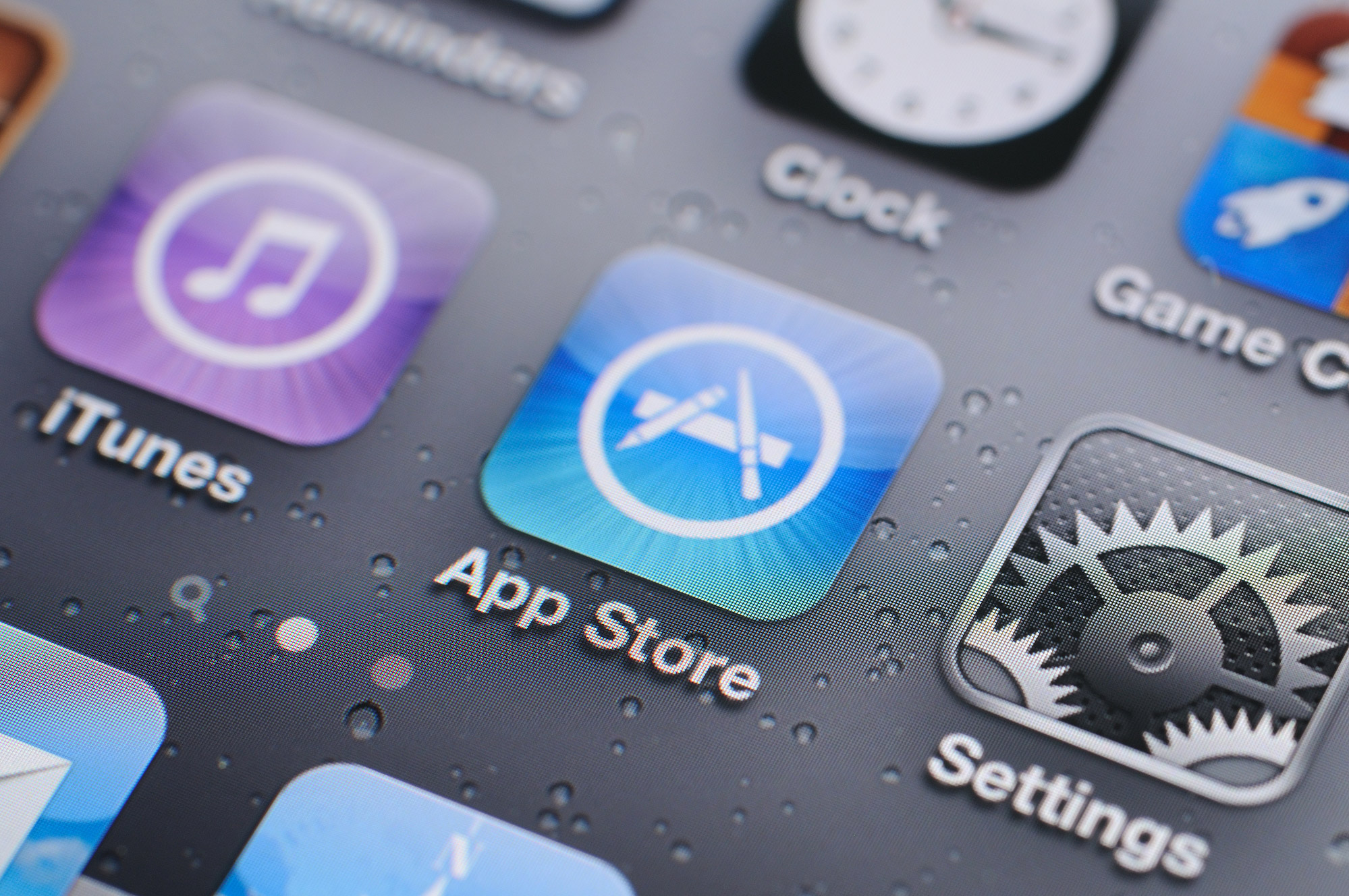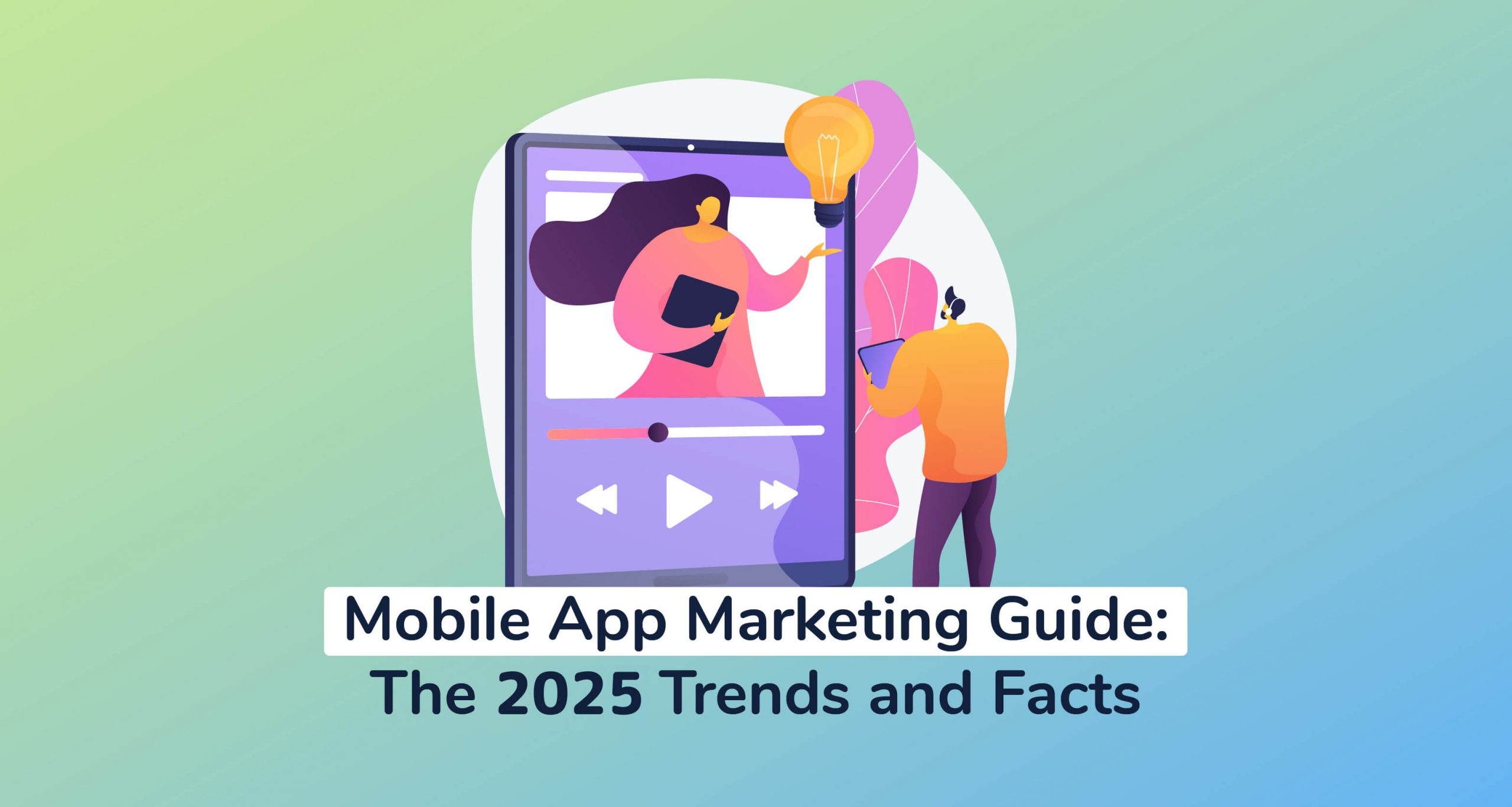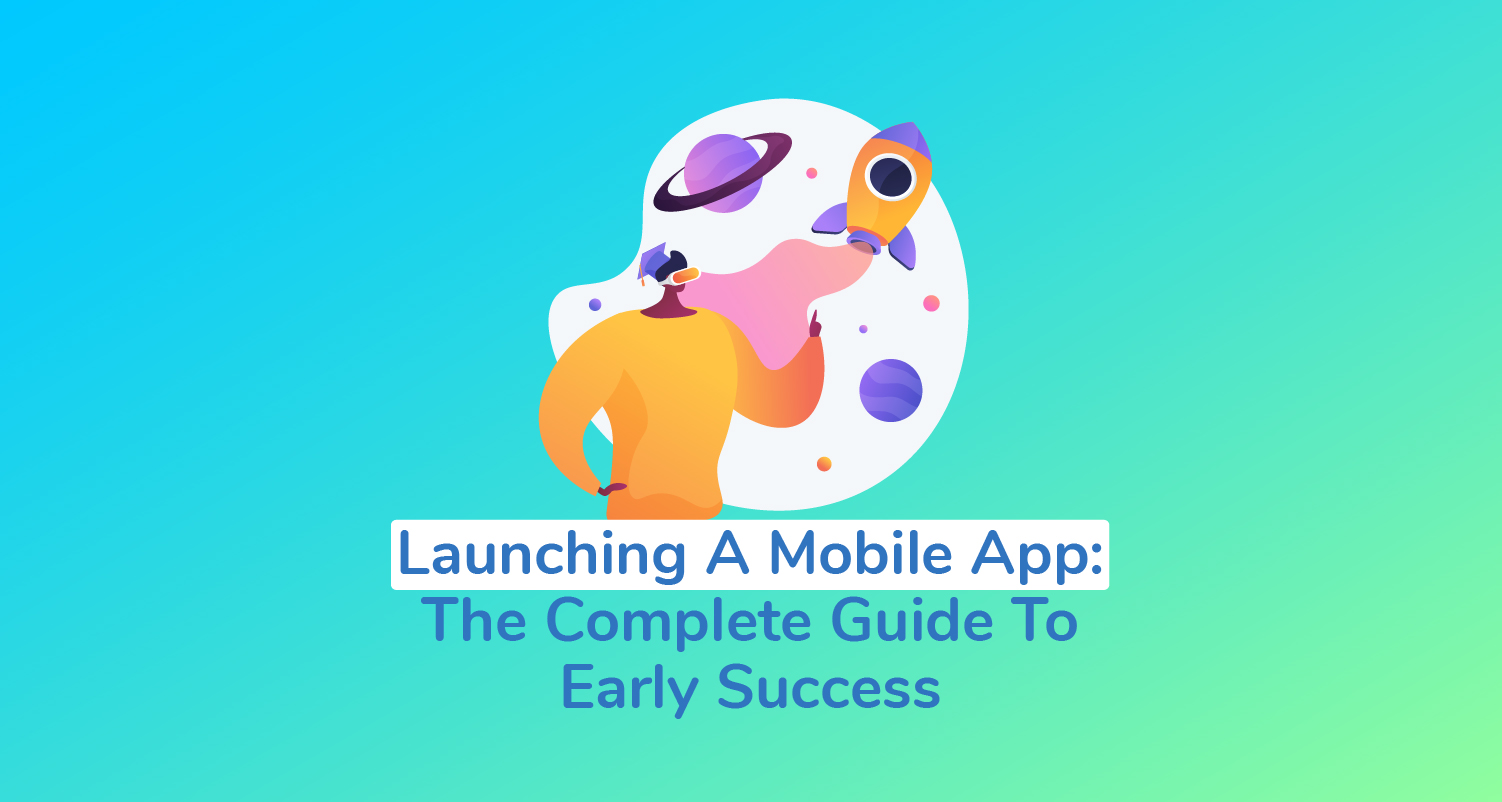
Mobile App Marketing Campaigns: 6 Successful AI Tricks
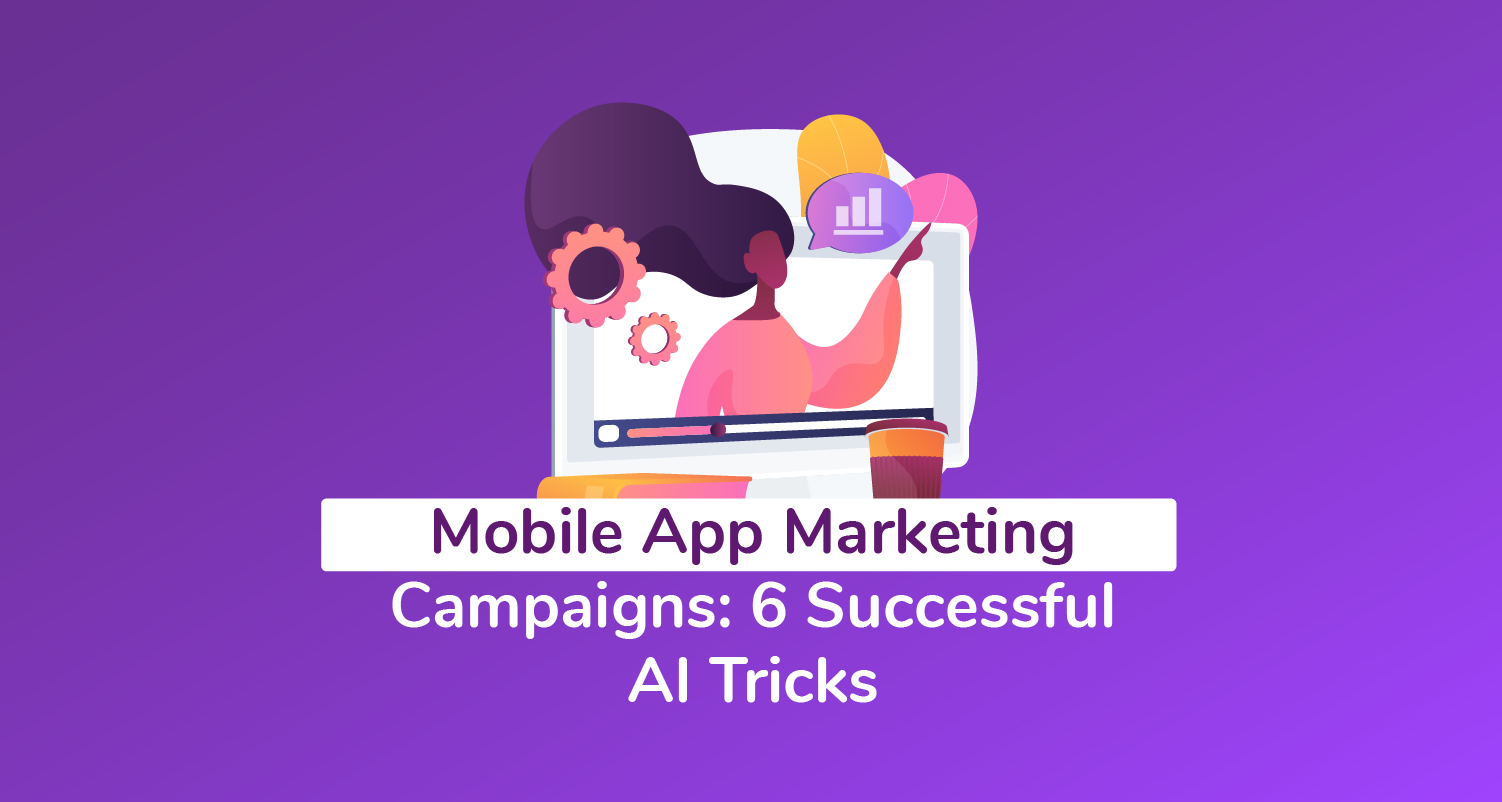
Table of Contents
What Artificial Intelligence Entails?
Role of Artificial Intelligence In Mobile App Marketing
- Delivering Personalized Content
- Providing In-Depth Insights
- Achieving Automated Reasoning
- Intelligent Keyword Optimization
- Engaging Users with Chatbots
- Competitor Analysis
With the increased competition we’re witnessing between mobile apps in the App Store, does AI stand to change the face of mobile app marketing as we know it?
If so, what exactly can we expect from AI-driven mobile app marketers? And how exactly can you leverage AI to improve your mobile app marketing campaigns?
Ok, here’s the thing. While all agree that combining artificial intelligence with mobile app marketing sounds exciting, it turns out there’s a lot of confusion and misunderstanding surrounding the whole concept of using AI in mobile app marketing.
Well, I say it’s time we revealed the real truth, and nothing but the truth.
I’ll start with myself. You see, as a seasoned mobile app marketing agency, PreApps has had the chance to leverage various aspects of AI in numerous mobile app marketing campaigns. We’ve tested it out on the App Store, social media (Facebook, Twitter), push notifications, you name it.
So, you might want to read along as we reveal:
- What artificial intelligence is all about when it comes to mobile app marketing.
- The role of artificial intelligence in mobile app marketing.
- How to capitalize on the power of AI in your mobile app marketing campaigns.
- How AI stands to impact your App Store interactions, app ads, mobile app downloads, app installs, and app users.
- The link between the Apple App Store and AI-driven mobile app marketing.
- The future of artificial intelligence in mobile marketing.
For the sake of clarity, though, what exactly is AI and how does it apply to the context of mobile app marketing.
What Artificial Intelligence Entails?
I bet you’ve come across this term many times already, and not just in mobile app marketing.
However, despite the persistent recurrence of the AI concept, it’s admittedly quite a tricky term to define conclusively. There are multiple varying descriptions out there, and they can be pretty confusing from time to time.
Now, in simple terms, artificial intelligence is all about using non-human elements with human-level intellect to methodically execute intelligent processes. It essentially makes it possible for machines to systematically process real-time data according to habitual human behavior and actions.
With that, AI seeks to achieve the following adaptive intelligent capabilities:
- Knowledge-context management
- Machine vision
- Natural language processing
- Machine learning
- Augmented reality
But, here’s the kicker – AI is not fully independent.
It substantially relies on human-developed programming to operate efficiently. Then the consequent accuracy depends on the structure, amount, frequency, and quality of data the AI algorithm is engineered to collect.
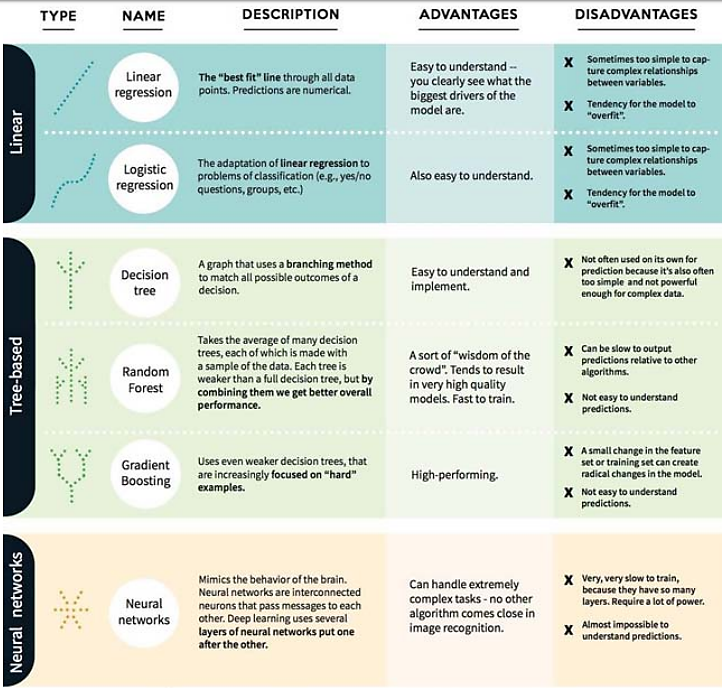
All things considered, a well-defined AI system could turn out to be one of your principal mobile app marketing assets. It has the power to revolutionize your entire app campaign by not only streamlining data collection, but also enhancing analysis, decision making, and user interaction.
Well, of course, you can bet everyone wants a piece of this action. That’s why, in fact, Gartner predicts that half of all online ads will utilize AI for intricate and detailed personalization by 2024. Social media sites like Facebook, Instagram, and Twitter are already doing it.
Make no mistake about it, though. While social media marketing has its notable successes with AI, you might not want to go at it alone. Rather, your mobile marketing strategy should be drawn up by professionals who know just how to blend AI with their app marketing services.
AI is consistently morphing at an astronomical rate, and so is digital mobile app marketing. Merging the two effectively is only possible after you’ve critically analyzed the capabilities and factor in the limitations of today’s AI – all in line with different app promotion tactics. Then, you’ve got to subsequently use the findings to set up a dynamic and flexible marketing strategy encompassing all the relevant parameters.
Confusing? Well, fortunately for you, we’ve got your back. PreApps happens to have successfully promoted more than 3,000 apps using various tools, including artificial intelligence. As part of our work, we’ve tried and tested multiple mobile marketing campaigns while embedding various forms of AI systems.
And here are the results…
Role of Artificial Intelligence In Mobile App Marketing
1. Delivering Personalized Content
We’ve previously discussed the relevance of content in mobile app marketing. In fact, we ultimately established that leveraging various forms of content is undoubtedly a great way of reaching out to your target audience.
Fair enough. But, one thing’s missing – how exactly should you optimize the content to engage your audience accordingly?
Now, there are multiple approaches you could capitalize on here. However, true engagement is best achieved through well-personalized content.
And you know what?
You see, personalization is incredibly effective in that the vast majority of app marketers report numerous benefits from using it – including improvements in brand building, lead generation, and customer acquisition.
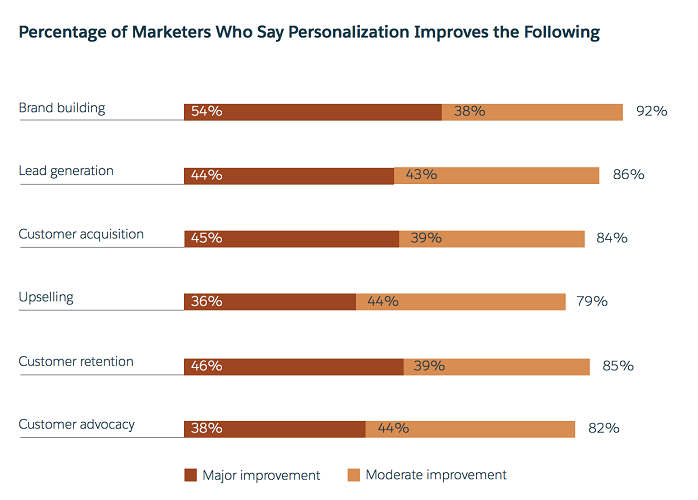
But, interestingly, while 92% of marketers are using personalization in some form, 55% do not believe that they have enough data for their marketing to be effective.
And that’s precisely where artificial intelligence comes in. AI-powered applications can make hyper-personalization a reality.
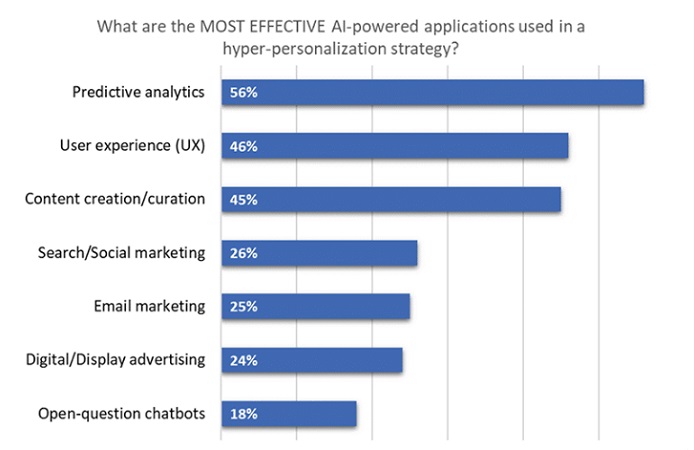
When it comes to mobile app marketing, AI employs machine learning to extensively sort through data, analyze each component independently, and subsequently make informed decisions about their respective preferences.
The content distribution system then takes advantage of the findings to automatically deliver well-personalized content to the target market. In the end, you get to communicate with each prospect differently (via email, social media, SMS, etc), and using offers that are uniquely aligned to their needs.
2. Providing In-Depth Insights
In the past, mobile app marketers principally defined their audiences based on demographics like gender, location, age, and mobile device type. Although this system was fairly helpful, it had one significant weakness – the data was quite generic.
Well, that’s until artificial intelligence found its footing in the mobile marketing scene. It now goes beyond the previous boundaries to gather large sets of data for extensive analysis, which in turn helps us understand our audiences at a much deeper level.
If you need to predict how your mobile app might be received after launching, for instance, you could simply generate insights from an AI engine to collect data from social media buzz, your prelaunch app marketing campaign, as well as app review user feedback. Then, using the data, you could analyze the corresponding trends and sentiments to establish predominant market patterns that might recur in the future.
Due to such capabilities, 61% of marketers (including mobile advertising gurus) now believe that AI is the most important element in their data framework. Additionally, a recent survey further established that artificial intelligence is indeed generating deeper insights through comprehensive data analysis, which ultimately boosts overall functionality, creativity, and decision-making.
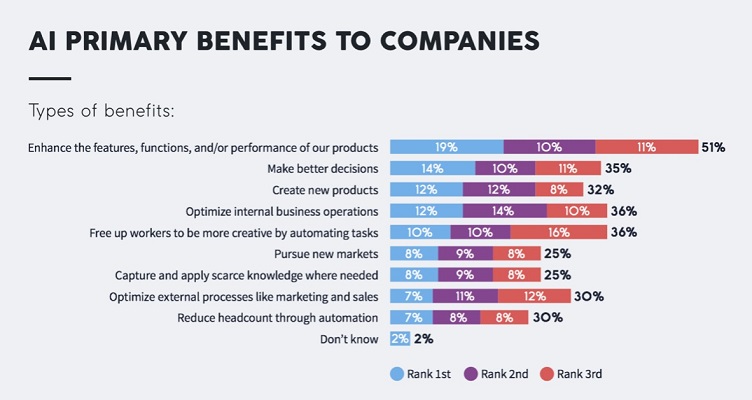
3. Achieving Automated Reasoning
Come to think of it, generating valuable data insights doesn’t have to be the end game. AI can go beyond that to act as your marketing minion, by taking relevant actions based on its data analytics.
But how does that work?
Ok, have you ever heard of automated reasoning? It basically entails using pre-defined sets of rules to automatically execute tasks based on data collected and analyzed by a machine learning engine. You can think of the whole thing as an artificial intelligence system that’s capable of making smart decisions without your intervention.
All in all, the objective is to respond to each individual interaction instance accordingly, based on the corresponding user behaviors, demographics, and preferences. In other words, it’s a form of personalized mobile app marketing that automatically takes action to influence various prospect decisions – according to specific usage patterns.
A perfect example would be a tool that you program to respond to site visitors who qualify as warm prospects after viewing your app demo video. It could perhaps attempt to influence the consumer’s decision journey by automatically redirecting viewers to your app’s App Store page.
And speaking of which, the standard customer decision journey framework provides multiple points for embedding dynamic automated reasoning protocols.
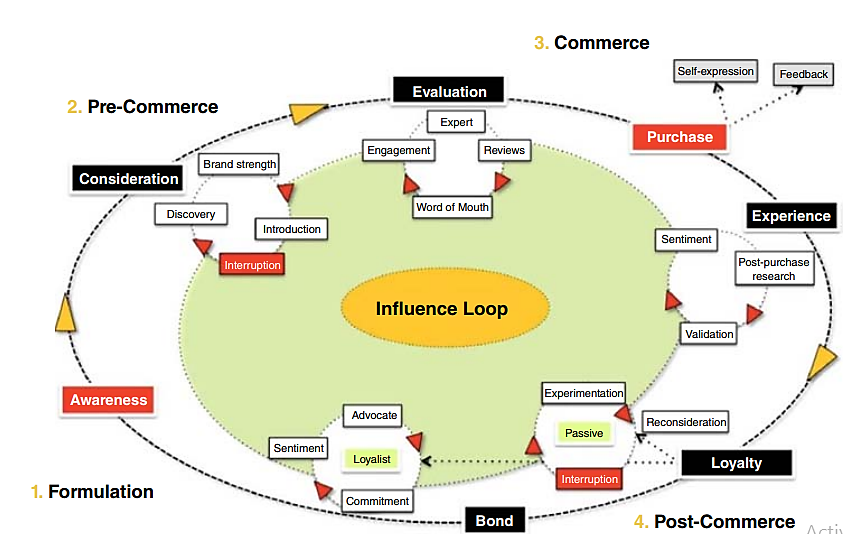
4. Intelligent Keyword Optimization
By now, it goes without saying that your App Store Optimization strategy relies heavily on the specific keywords you choose for your app.
Now, that might seem like a pretty simple undertaking at first. But, if you’ve tried tracking the performance of various sets of keywords, you may have noticed how complicated the whole thing can get.
With 2 million apps and counting, the App Store is certainly no easy place for a beginner app. It’s a jungle made up of competitive apps that are always thirsty for new users. So, you can bet that many of them have already beaten you to the list of generic keywords.
But guess what?
Fortunately, it turns out that you can still work around that by utilizing artificial intelligence in your App Store Optimization. Instead of repeatedly testing out multiple sets of keywords, you can simply take advantage of AI to identify the most suitable ones right off the bat.
A robust tool basically analyzes numerous factors, including popular App Store searches, keyword thesaurus, your app’s metadata, competitor apps, app search traffic, and keyword clusters to generate a list of ideal keywords for your app.
And that’s not all. It can also monitor the consequent search traffic patterns to help you adjust accordingly to changing market preferences and trends.
5. Engaging Users with Chatbots
Over the past couple of years, chatbot tech has grown astronomically to become one of the most dominant components of today’s AI. And since the use of voice assistants like Siri, Google Assistant, and Alexa, on a daily basis has been steadily increasing, you could say that almost all smartphone users are now familiar with chatbots.
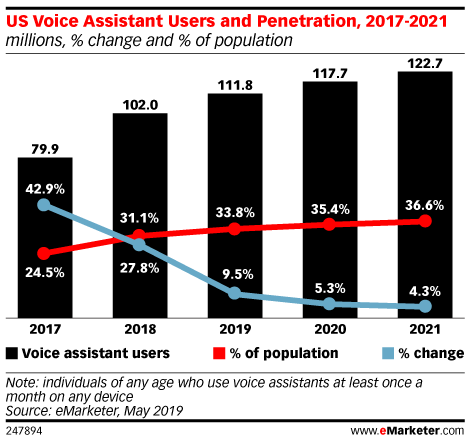
As a matter of fact, many have grown incredibly fond of technology. Sixty-two percent of consumers stated that they preferred to use a chatbot to interact with a business, particularly if they needed an instant answer to a question. Furthermore, companies using chatbot AI have seen a 67% spike in conversions – with 26% of all sales occurring through an interaction with a chatbot.
That said, it just so happens that mobile app marketing is also tapping into this newfound optimism among consumers. We’re now adopting various forms of chatbots to automatically engage prospects, as well as collect valuable feedback from regular app users.
While some apps have embedded text chatbots, others have integrated voice-based mechanisms.
6. Competitor Analysis
Interestingly, artificial intelligence has also changed how businesses relate to their competitors.
Instead of hiring professional spies, businesses are now relying on artificial intelligence to legally monitor their competitors’ moves and strategies. As a result, it’s expected that in 2020, insight-driven brands will steal about $1.2 trillion per year from their uninformed counterparts.
And if you happen to assume that this tactic is only meant for a select few, then get this – 84% of enterprises are now capitalizing on AI to achieve such a competitive advantage.
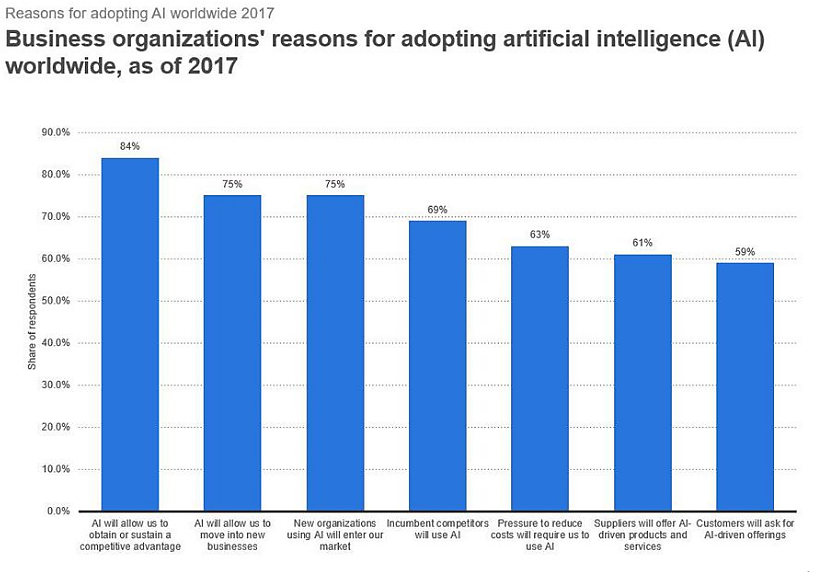
In other words, if you’re not leveraging AI to gain insights into your competitor apps, then you can be sure that someone is already monitoring your app marketing strategy and app store optimization techniques.
Now, the best way to counter that would be to set up a comprehensive competitor analysis system with proven tools for all the relevant marketing channels (including the App Store and social media). Combined, they’ll help you catch up or stay ahead of your rival apps by tracking and responding accordingly to their individual app marketing campaigns.
Key Takeaways
Overall, you might want to keep in mind that:
- Although AI has eliminated about 1.8 million jobs, the truth of the matter is that it will create 7 million new jobs.
- 92% of marketers currently utilize AI personalization – but 55% require more data in order to create more customized experiences.
- AI employs machine learning to extensively sort through data, analyze each individual independently, and subsequently make informed decisions about their respective preferences.
- AI now goes beyond the previous boundaries to gather large sets of data for extensive analysis, which in turn helps us understand our audiences on a much deeper level.
- 61% of marketers now believe that AI is the most important element in their data framework.
- Automated reasoning basically entails using pre-defined sets of rules to automatically execute tasks based on data collected and analyzed by a machine learning engine.
- A robust AI tool basically analyzes numerous factors, including popular App Store searches, keyword thesaurus, your app’s metadata, competitor apps, app search traffic, and keyword clusters- to generate a list of ideal keywords for your app.
- 62% of consumers are happy to use an AI-powered chatbot to engage with a company.
- Chatbots have increased online conversions by 67 percent.
- We’re now adopting various forms of chatbots to automatically engage prospects, as well as collect valuable feedback from regular app users.
- 84% of enterprises are now capitalizing on AI to achieve a competitive advantage.
Conclusion
Companies that fail to capitalize on AI in their marketing campaigns and software applications will quickly be taken over by their competitors. That’s a fact. Artificial intelligence offers numerous advantages to your marketing strategy – particularly in terms of hyper-personalization, data collection, and analysis.
And with that said, do you think your sentiments about artificial intelligence have changed? Is it something you might consider for your mobile app marketing?
You can go ahead and share your thoughts in the comments section.
And, as always, feel free to reach out to our expert mobile app marketers to learn how to implement an AI system tailored to your precise needs.
Newsletter
Don’t miss a thing! Sign up to receive daily news
Subscribe Newsletter





